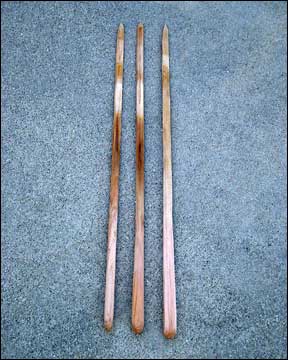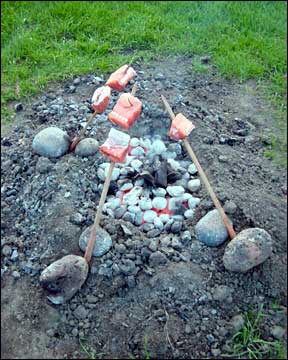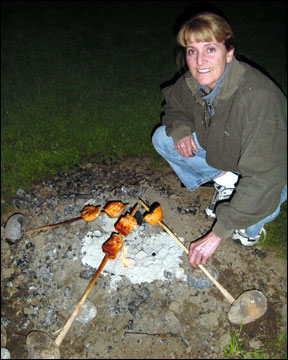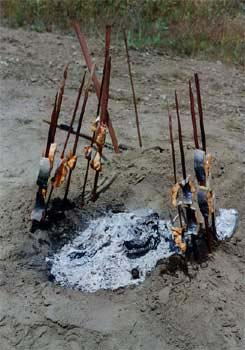
The sight of crispy golden salmon roasting over hot coals is enough to stimulate anyones taste buds. The aroma is so overpowering. The taste is incredibly delicious. This slow process of cooking salmon on cedar stakes will tantalize all your senses as you feast on this simple and scruptious meal.
All you need are wooden stakes made out of cedar or redwood. I have also used branches made out of willow. You can probably use any wood that is not toxic or will not impart an unpleasant taste to your food. Still, I prefer the smell of cedar wood. The cedar stakes are sharpened on one end and thicker at the bottom. The stake has a flat area in which to keep the salmon meat from rotating and sliding on the wood. My cedar stakes are 24 inches long.

Leave the skin on your salmon steaks or fillets. This will help to keep the meat together as the fish is cooking. The salmon is skewered through the skin and meat. Poke the cedar stake first through the meat, exit out the skin, through another part of the skin, exit out the meat portion, and so on. If you only have small chunks of salmon, at least skewer the skin once or twice.
Get your bed of coals started before you begin your salmon preparation. Hardwoods (e.g. oak, madrone, manzanita, hickory) yield the best long lasting coals. The heat from the hot coals of hardwoods will be fairly consistant. Softwoods, like conifers and some evergreens, produce a hot, fast fire that is short-lived. The coals from softwoods are not ideal for salmon cooking. If you can't find any wood for the fire, you can substitute brickets from the store. The cooking is done over hot coals and not over a fire.
Soak the entire cedar stakes in a bucket of water for a few hours. The saturated wood will keep your stakes from burning or drying out too fast.
After you have skewered your salmon, push the bottom end of your cedar stake into the ground. I carved a point on the thick bottom portion of my stakes to make it easier to push the wood into the dirt. Place a small rock under and near the bottom end of the stake. Lean the cedar stake toward the hot coals. Position a larger rock over the lower portion of the stake to keep it from popping out of the ground (see the photo below). The salmon meat should be facing toward the coals so that it will cook first. The skin will hold the fish together and keep the meat from falling apart during the cooking process.

Let your salmon cook on one side, then rotate the stake to cook the other side. Be patient and let this slow cooking process roast the salmon meat to a golden brown. Continue rotating your fish over the hot coals. Check to see where the hot spots are located in your fire pit. As the coals burn down, move your cedar stakes to another hot spot.
Nothing beats a slow roasted salmon meal. Enjoy!

Other methods of roasting salmon:



Illustration reference:
"Indian Fishing, Early Methods on the Northwest Coast"
by Hilary Stewart, University of Washington Press
E-mail your comments to "Dino Labiste" at KahikoArts@yahoo.com
We hope the information on the PrimitiveWays website is both instructional and enjoyable. Understand that no warranty or guarantee is included. We expect adults to act responsibly and children to be supervised by a responsible adult. If you use the information on this site to create your own projects or if you try techniques described on PrimitiveWays, behave in accordance with applicable laws, and think about the sustainability of natural resources. Using tools or techniques described on PrimitiveWays can be dangerous with exposure to heavy, sharp or pointed objects, fire, stone tools and hazards present in outdoor settings. Without proper care and caution, or if done incorrectly, there is a risk of property damage, personal injury or even death. So, be advised: Anyone using any information provided on the PrimitiveWays website assumes responsibility for using proper care and caution to protect property, the life, health and safety of himself or herself and all others. He or she expressly assumes all risk of harm or damage to all persons or property proximately caused by the use of this information.
© PrimitiveWays 2013